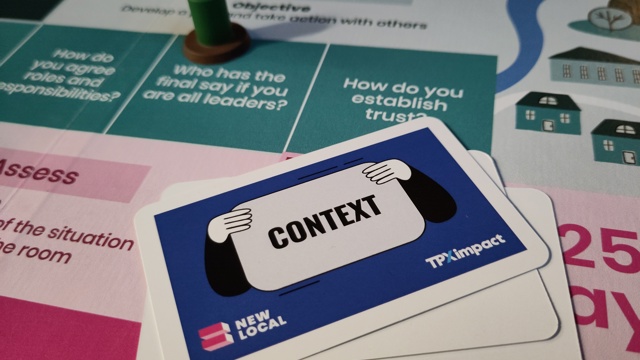The new government is committed to transforming the UK into a green energy superpower. But integrating renewables into the grid is inconsistent and expensive, planning delays hold up development and the data organisations need to innovate is in short supply.
Our energy system needs radical change to meet future demands and our net zero ambitions. There’s no silver bullet, but with artificial intelligence (AI) supposedly providing disruptive changes to every sector, we wanted to understand how the landscape might be evolving - and where industry leaders are using the technology.
We brought together innovators and system thinkers from sectors such as energy companies; electric vehicle infrastructure; renewable energy; think tanks; not-for-profits; and a few of us from TPXimpact. The discussion focussed on three key themes: The Now, The Near, and The Next.
The Now: Barriers and complexity
It was refreshing to hear that the potential for the current generation of AI to disrupt the energy sector is relatively low. A week ago, we were at a similar roundtable on the impact of AI on the legal profession hosted by Reform, and there the ramifications for the workforce and regulation are profound.
But in energy, the impact will be milder, and therefore the adoption of new technologies is currently slow. This presents an opportunity for much more careful, planned adoption of AI. One reason given for this was the complexity of the energy system, where it's hard to understand which changes will unlock progress. Another is UK organisations’ attitude towards innovation, which tends to focus on risk management. This often makes them hesitant to fully embrace AI with its host of data privacy, security, and regulatory hurdles.
AI thrives on vast amounts of high-quality information. But the energy sector faces significant barriers with multiple data silos, fragmented systems, and outdated infrastructure. While some consumer-facing, digitally native energy companies are using techniques like Machine Learning to manage demand and measure activity, many are constrained by inconsistent data management practices and regulatory bottlenecks. One participant highlighted that in some parts of the UK, key data is still stored on paper – a stark reminder of the work that needs to be done.
"I think a lot of people talk about AI, even want to do AI, but I'm not sure we are ready with data strategies."
Despite these challenges, there was a clear agreement that AI can and will eventually transform the industry. The use of it in grid optimisation, predictive maintenance, and balancing supply and demand, along with the introduction of half-hourly settlements, are all promising, national-level changes.
The Near: Building trust and connecting systems
Over time though, we will sort out data and widespread adoption of AI will mean the way people interact with energy will change. Now energy is mostly one-directional - when you flick a switch, the light comes on. In the future, each electrified house will provide a mix of generation, consumption, storage and smart management.
Driving this will be the growing consumer adoption of connected technologies such as electric vehicles (EVs), solar panels, and heat pumps. These devices represent a huge opportunity for optimisation, but right now, there is a clear disconnect and gap between the potential value of these technologies and real customer experience. Homeowners often find themselves managing multiple apps and navigating complex systems that don’t talk to each other, missing out on potential savings and efficiency gains.
"A normal, average user who really doesn’t care, they just want this to work, has seven apps that they're supposed to stay on top of and understand what's going on to make all of this work."Sara Brooks
Co-CEO, Zoa
Much like how open banking revolutionised the financial sector by enabling seamless data sharing, the concept of what we could call "open energy" was proposed – where data sharing standards allow aggregation of data and an optimised experience for consumers. However, incentivising consumers and gaining trust (through transparency) kept surfacing as the factors in driving AI adoption. Consumers are willing to trade some control over devices in exchange for benefits like lower tariffs. But the key to realising this potential lies in building consumer confidence. Many people are reluctant to hand over control of their personal energy assets. This is especially true when it involves sensitive data or high-value items like EV batteries.
Regulation was another critical area of conversation. Government and regulators need to take a more active role in facilitating AI adoption. We agreed that this didn’t mean heavy-handed regulation. Instead, it means creating a framework that encourages innovation while protecting consumers. Again, lessons from the finance industry, such as the introduction of open standards and data-sharing regulations, stood out as offering a potential blueprint for the energy sector.
The Next: Shaping a smarter, greener future
The final part of our conversation focused on the long-term potential of AI in the energy sector. We agreed that these technologies can revolutionise the industry in ways that are difficult to imagine today. In the next three to five years, advancements in material science, powered by AI, could lead to breakthroughs in storage and generation technologies, such as better batteries and more efficient solar panels. These could shift the landscape, making renewable energy even more cost-effective and accessible.
But we also acknowledged that as AI adoption increases, so will energy demand. Striking a balance between AI-driven growth and sustainable energy consumption will be a key challenge for both government and industry leaders. Collaboration will be essential. Not just between energy companies and AI specialists, but across entire ecosystems, including regulators, consumers, and tech providers.
"This is the era of collaboration. This is not the era of competition. I think we all need to agree and believe in this. What is needed for this collaboration? First is policies with incentives for everyone, second, is integrated data sources."Anurag Agrawal
Vice President - EMEA and Global Strategic Initiatives, Celebal Technologies
We were hopeful that AI could help address some of the more complex, systemic challenges within the energy sector. This included things such as grid flexibility and the integration of intermittent renewable sources like wind and solar. AI’s ability to process vast amounts of data in real time means it’s well-positioned to handle the complexities of modern energy systems.
An AI revolution with people at its core
What stood out to me throughout this roundtable was that the focus wasn't only on AI – it was also on people. Rather than getting bogged down in the technicalities, the focus shifted to leadership, collaboration, trust, and getting people on board. It was a reminder that no matter how advanced the technology, it’s always the human element that drives progress.
AI’s impact on the energy sector will be shaped by how well we navigate these human factors. The energy transition won’t only be about cutting-edge tech – it will be about creating a system that people believe in and want to be part of. If we work together, we can make this system real and revolutionise how we generate and use energy in the years ahead.

Working together to transform policy and delivery
Find out how shared data, collaboration and empathy are needed to improve how we plan and deliver for people, places and the planet.
Read more
Transforming energy & net zero
We partner with the energy sector to shape new technologies, behaviours and capabilities for the transition to net zero.
Work with usOur recent insights
Transformation is for everyone. We love sharing our thoughts, approaches, learning and research all gained from the work we do.

The role of play in building leadership skills
How play can offer local government leaders a powerful tool to break free from rigid structures.
Read more
A game-changing approach to leadership
Radical Leaders: The Game! uses real-world crisis scenarios to challenge local government leaders, fostering collaboration, agility, & community focus.
Read more
Transforming archiving through AI
How artificial intelligence can turn archives into living resources that shape the future while preserving the past.
Read more

